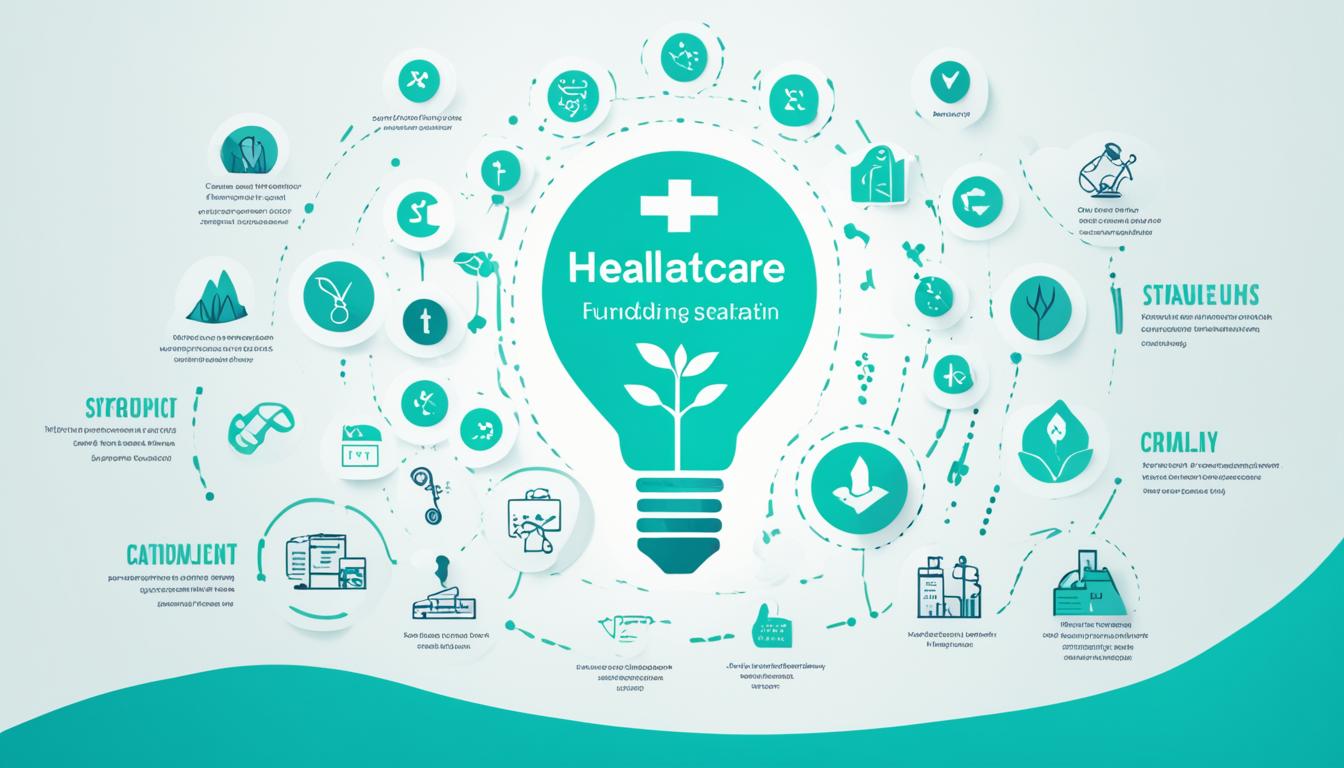Have you ever wondered what captivates venture capitalists (VCs) in the rapidly evolving healthcare startup landscape? In this article, I’ll delve into the latest trends in VC funding for healthcare startups, uncovering the key areas that are attracting significant investments and shaping the future of the industry.
Key Takeaways
- The healthcare startup landscape is undergoing a remarkable transformation, driven by innovative solutions and technologies.
- Venture capitalists are increasingly recognizing the immense potential for growth and innovation in the healthcare sector.
- Digital health solutions, such as telemedicine and mobile health apps, are among the hottest investment trends in the healthcare startup space.
- Breakthroughs in biotech and pharmaceuticals, including gene editing and personalized medicine, are also attracting significant VC funding.
- The medical technology (medtech) sector is revolutionizing healthcare delivery, with startups developing cutting-edge innovations in robotics, diagnostics, and imaging.
Introduction
The healthcare industry has been undergoing a remarkable transformation, driven by the emergence of innovative startups that are disrupting traditional models of care delivery and drug development. This burgeoning healthcare startup landscape has caught the attention of venture capitalists, who are increasingly recognizing the immense potential for growth and healthcare innovation in this sector.
Venture Capitalists’ Growing Interest in Healthcare
Venture capitalists have been closely monitoring the healthcare startup landscape, recognizing the vast opportunities for healthcare investment trends and the potential for venture capital interest in healthcare. These investors have been pouring significant sums of money into healthcare startups, fueling the development of cutting-edge technologies and transformative solutions that have the power to reshape the industry.

From digital health solutions to advancements in life sciences and medical technology, the healthcare startup ecosystem is brimming with possibilities that have captured the attention of venture capitalists. As the industry continues to evolve, this What are the latest trends in venture capital funding for healthcare startups? will only continue to grow, attracting even more investment and accelerating the pace of innovation in the healthcare sector.
Digital Health: The Hottest Investment Trend
The healthcare industry has witnessed a remarkable transformation, and one of the most prominent trends in venture capital (VC) funding for healthcare startups is the surge in investment in digital health solutions. The COVID-19 pandemic has accelerated the adoption of telemedicine and remote patient monitoring, and venture capitalists have been quick to capitalize on this growing demand.
Telemedicine and Remote Patient Monitoring
Telemedicine, which enables healthcare providers to deliver care remotely, has seen a significant increase in popularity and investment. Startups in this space are developing innovative solutions that make it easier for patients to access medical care, particularly in underserved or rural areas. Similarly, remote patient monitoring technologies that allow healthcare providers to track patient data and vital signs from a distance have attracted significant VC attention.
Mobile Health Apps and Wearable Technology
Alongside the rise of telemedicine and remote patient monitoring, venture capitalists have also been investing heavily in mobile health apps and wearable technology. These digital health solutions empower patients to take a more active role in managing their own healthcare, with features that enable self-monitoring, medication adherence, and personalized health insights. The integration of wearable devices, such as fitness trackers and smartwatches, has further expanded the capabilities of these mobile health apps, providing a comprehensive view of an individual’s overall health and wellness.

Biotech and Pharmaceutical Breakthroughs
The life sciences sector, encompassing biotech and pharmaceutical startups, has been a significant focus for venture capital investment. These innovative companies are at the forefront of unlocking the secrets of life, developing cutting-edge gene editing and personalized medicine therapies that have the potential to transform the healthcare landscape.
Gene Editing and Personalized Medicine
Advancements in gene editing technologies, such as CRISPR, have opened up new possibilities for precisely targeting and modifying genetic sequences. Biotech startups are leveraging these groundbreaking tools to develop highly targeted and effective treatments, paving the way for a future of personalized medicine where therapies are tailored to an individual’s unique genetic profile.
Innovative Drug Delivery Systems
Alongside the developments in gene editing and personalized medicine, pharmaceutical breakthroughs have also attracted significant biotech venture capital funding. Startups are exploring innovative drug delivery systems that can improve the efficacy, safety, and patient experience of traditional pharmaceutical products. From novel formulations to smart drug delivery platforms, these advancements are poised to revolutionize the way we approach drug development and administration.

What are the latest trends in venture capital funding for healthcare startups?
The healthcare startup landscape has been a magnet for venture capital (VC) investment in recent years, reflecting the growing appetite for innovative solutions that have the potential to transform the industry. From the digital health sector to life sciences breakthroughs, venture capitalists are directing significant funding towards healthcare startups that are developing cutting-edge technologies and therapies.
One of the most prominent trends in VC funding for healthcare startups is the surge in investment in digital health solutions. The COVID-19 pandemic has accelerated the adoption of telemedicine and remote patient monitoring, and venture capitalists have been quick to capitalize on this growing demand. Startups in the mobile health apps and wearable technology space have also attracted substantial VC funding as they work to revolutionize the way healthcare is delivered.
The life sciences sector, encompassing biotech and pharmaceutical startups, has also been a key focus for venture capitalists. Advances in areas like gene editing and personalized medicine have created exciting opportunities for innovative therapies and drug delivery systems. Venture capitalists are recognizing the immense potential of these healthcare innovation funding solutions to transform the industry and are directing significant resources towards supporting these startups.
Beyond digital health and life sciences, venture capitalists have also been investing in healthcare IT startups that are working to streamline operations and improve the overall efficiency of the healthcare system. This includes companies focused on electronic health records (EHR), data analytics, and cybersecurity and privacy solutions.
As the healthcare startup landscape continues to evolve, venture capitalists are closely monitoring emerging technologies and disruptive innovations that have the potential to transform the industry. Additionally, global health trends, such as the COVID-19 pandemic, are shaping the future of healthcare investing, as venture capitalists seek out startups that are well-positioned to address the evolving needs of the healthcare ecosystem.

Medtech: Revolutionizing Healthcare Delivery
The medical technology (medtech) sector has been a significant recipient of venture capital funding, as startups in this space work to revolutionize healthcare delivery. From advancements in robotics and surgical innovations to cutting-edge diagnostic and imaging technologies, the medtech landscape is ripe for investment.
Robotics and Surgical Innovations
Robotic surgical systems have become increasingly sophisticated, offering greater precision, dexterity, and control for healthcare providers. Startups in this field are developing innovative surgical robots that can perform complex procedures with unparalleled accuracy, reducing the risk of complications and improving patient outcomes. These advancements in robotics and surgical innovations are transforming the way healthcare is delivered, making minimally invasive procedures more accessible and effective.
Diagnostic and Imaging Technologies
The medtech sector has also witnessed a surge in investment for startups focused on developing next-generation diagnostic and imaging technologies. These cutting-edge solutions have the potential to transform the way healthcare providers identify, diagnose, and monitor a wide range of medical conditions. From advanced imaging systems that provide more accurate and detailed visualizations to innovative diagnostic tools that enable early detection of diseases, these technologies are poised to revolutionize healthcare delivery and improve patient outcomes.

| Medtech Sector | Key Innovations | Potential Impact |
|---|---|---|
| Robotics and Surgical Innovations | Sophisticated robotic surgical systems, advanced surgical tools and techniques | Improved precision, reduced complications, and enhanced patient outcomes in complex procedures |
| Diagnostic and Imaging Technologies | Next-generation imaging systems, innovative diagnostic tools for early disease detection | More accurate and efficient diagnosis, enabling earlier intervention and better patient care |
Life Sciences: Unlocking the Secrets of Life
The life sciences sector, encompassing biotech and pharmaceutical startups, has been a significant focus for life sciences investment. These startups are at the forefront of unlocking the secrets of life, developing cutting-edge therapies and treatments that have the potential to transform the healthcare innovation funding landscape.
While the healthcare startup ecosystem has experienced an unprecedented run of funding in recent years, the perception of abundant money for health tech startups has not always matched reality. Nonetheless, there remains a considerable demand for innovative ideas in healthcare, as many of these innovative solutions face challenges in finding a clear path forward, impeding effective care delivery.
In this climate, novel approaches to address real-world problems are favored for biotech venture capital investment. The path to profitability in healthcare innovation is often complex, underscoring the importance of involving clinicians as investors and advisors in health tech startups for their success. Clinicians are encouraged to support early-stage founders in the current healthcare innovation landscape, and founders are urged to seek support from doctors as investors and advisors for their startups.

| Key Trends in Life Sciences Investment | Opportunities for Healthcare Innovation |
|---|---|
| Surge in biotech venture capital funding | Developing cutting-edge pharmaceutical breakthroughs |
| Focus on personalized medicine and gene editing | Transforming the healthcare innovation funding landscape |
| Innovative drug delivery systems | Addressing unmet medical needs |
Healthcare IT: Streamlining Operations
Beyond the thriving sectors of digital health and life sciences, venture capitalists have also been directing significant funding towards healthcare IT startups that are working to streamline operations and improve the overall efficiency of the healthcare system. These innovative companies are focused on developing cutting-edge solutions in electronic health records (EHR), data analytics, and cybersecurity and privacy solutions.
Electronic Health Records (EHR) and Data Analytics
The adoption of electronic health records (EHR) has been a game-changer for the healthcare industry, enabling healthcare providers to digitize and manage patient data more effectively. Venture capitalists have been closely monitoring the EHR landscape, investing in startups that are leveraging advanced data analytics to unlock valuable insights from this vast repository of healthcare data. By employing sophisticated algorithms and machine learning techniques, these healthcare IT startups are empowering healthcare organizations to make more informed decisions, enhance patient outcomes, and optimize resource allocation.
Cybersecurity and Privacy Solutions
As the healthcare industry becomes increasingly reliant on digital technologies, the need for robust cybersecurity and privacy solutions has never been more critical. Venture capitalists have recognized the importance of safeguarding sensitive patient data and have been directing funding towards healthcare IT startups that are developing innovative cybersecurity and privacy solutions. These startups are working to protect healthcare organizations from the growing threat of cyber attacks, ensuring the confidentiality and integrity of patient information while enabling healthcare providers to deliver high-quality, secure care.

Funding Challenges and Opportunities
While the healthcare startup landscape is thriving, healthcare entrepreneurs often face unique funding challenges and regulatory hurdles that can impede their progress. Navigating the complex healthcare ecosystem and ensuring compliance issues are addressed can be daunting tasks for many startup founders. However, these challenges also present valuable opportunities for collaborations and strategic partnerships that can help healthcare startups succeed.
Regulatory Hurdles and Compliance Issues
The healthcare industry is heavily regulated, and healthcare startups must navigate a web of regulatory hurdles and compliance issues to bring their innovations to market. From securing regulatory approvals to maintaining data privacy and security standards, healthcare entrepreneurs face a unique set of obstacles that require specialized expertise and resources. Successful startups often rely on strategic partnerships with established healthcare organizations or regulatory consulting firms to overcome these challenges and ensure their products or services meet the necessary requirements.
Collaborations and Strategic Partnerships
In the face of healthcare startup funding challenges, collaborations and strategic partnerships can be game-changing for early-stage companies. By partnering with larger healthcare organizations, pharmaceutical companies, or medical device manufacturers, healthcare startups can gain access to valuable resources, expertise, and distribution channels. These collaborations can help startups navigate regulatory landscapes, secure additional funding, and accelerate their path to market. Similarly, venture capital investments can provide healthcare startups with the financial resources and strategic guidance needed to scale their operations and drive innovation.

| Challenge | Opportunity |
|---|---|
| Regulatory Hurdles | Collaborations with established healthcare organizations |
| Compliance Issues | Strategic partnerships with regulatory consulting firms |
| Funding Gaps | Venture capital investments and strategic guidance |
The Future of Healthcare Investing
As the healthcare startup landscape continues to evolve, venture capitalists are keeping a close eye on the emerging technologies and disruptive innovations that have the potential to transform the industry. The rapid advancements in areas like artificial intelligence, robotics, and gene editing are creating exciting new opportunities for healthcare startups to disrupt traditional models of care delivery and drug development.
Emerging Technologies and Disruptive Innovations
From AI-powered diagnostic tools to wearable devices that continuously monitor patient health, the healthcare sector is poised to witness a wave of transformative technologies in the years to come. Venture capitalists are particularly interested in startups that are leveraging these emerging technologies to develop innovative solutions that can improve patient outcomes, streamline operations, and reduce healthcare costs.
The Impact of Global Health Trends
In addition to advancements in technology, global health trends, such as the COVID-19 pandemic, are also shaping the future of healthcare investing. The increased focus on telemedicine, remote patient monitoring, and public health infrastructure has opened up new avenues for investment in the healthcare startup landscape. Venture capitalists are closely monitoring these global health trends to identify opportunities that align with the evolving needs of the healthcare industry.

Conclusion
The healthcare startup landscape has been a hotbed of venture capital investment in recent years, with a surge in funding for innovative solutions across a diverse range of sectors. From the rapid growth in digital health technologies, such as telemedicine and remote patient monitoring, to the breakthroughs in biotechnology and personalized medicine, venture capitalists have demonstrated a keen interest in healthcare startups that are poised to disrupt traditional models of care delivery and drug development.
As the healthcare industry continues to evolve, venture capitalists are closely monitoring emerging technologies and global health trends that have the potential to transform the way we approach healthcare. Whether it’s the advancements in medical technology, the streamlining of healthcare operations through IT solutions, or the unlocking of the secrets of life through life sciences, the future of healthcare investing looks increasingly promising.
Despite the challenges and regulatory hurdles that healthcare startups often face, the industry’s ability to attract significant venture capital funding is a testament to the immense potential for innovation and growth. As we move forward, I am excited to see how the healthcare startup landscape will continue to evolve, and how venture capitalists will play a pivotal role in shaping the future of healthcare delivery and innovation.
